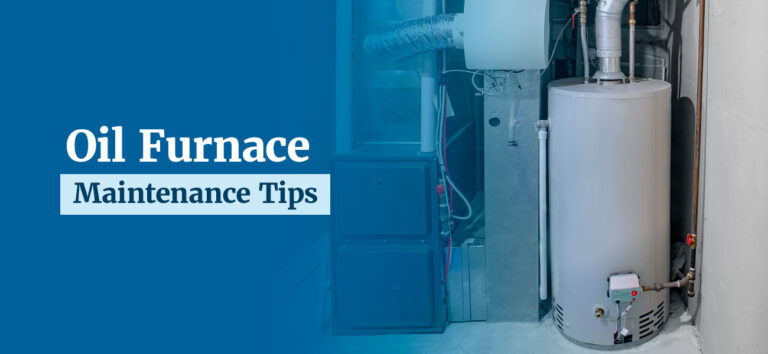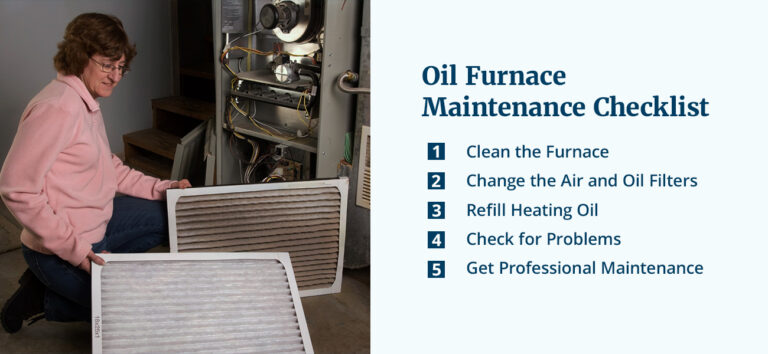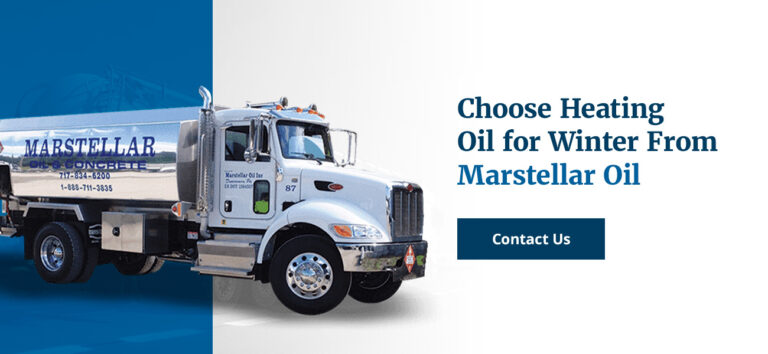
As the colder months set in, you need to start prepping your heating system for winter. Oil furnaces are excellent for reliable, efficient home heating during the coldest months of the year, but they need some care to ensure they’re performing at their best. Here are some tips for oil furnace maintenance so you can keep your home comfortable without driving up costs during the winter.
Benefits of Oil Furnace Maintenance
Like any system, your oil furnace needs regular maintenance to keep everything in good condition and working efficiently. Neglecting maintenance can affect how well your furnace works and how long it lasts. Setting aside time to ensure your furnace is well-maintained will help keep your home comfortable and safe throughout the year.
Here are some of the benefits of oil furnace maintenance:
- Increased efficiency: A well-maintained furnace will run better than a poorly-maintained one. Your furnace will have to work harder to meet the same output, using more energy and increasing your bills. The less efficient your furnace is, the more you’ll pay for heating and the more strain you’ll put on your system. Giving your furnace a tuneup will have it running at maximum efficiency, saving you lots of money.
- Lower repair costs: Ignoring furnace maintenance allows minor problems to become major ones. Left unchecked, you’ll have to spend more on repairs that could’ve been caught early with regular maintenance. Save yourself the headache and get your furnace checked now to avoid expensive repairs down the road.
- Good airflow: A clean, maintained furnace won’t have any blockages or debris that might restrict airflow. Additionally, a quick adjustment could get all your furnace components working at their best. You’ll enjoy better airflow when your furnace has had its regular checkup.
- A safer home: Small problems left unfixed could turn into more significant, dangerous issues. Maintenance will ensure everything on your furnace is working correctly and isn’t putting your home at risk. You’ll sleep better at night knowing your furnace is in top condition.

Oil Furnace Maintenance Checklist
While you should get professional furnace servicing to ensure everything is working correctly, there are a few ways you can do oil furnace maintenance DIY. Some of the oil furnace maintenance steps you can do on your own include:
1. Clean the Furnace
Keep your furnace and the area around it clean to ensure it’s clear of debris and functioning efficiently. To clean your furnace, turn it off and let it cool down completely — you don’t want to burn yourself accidentally. Once the furnace is cool, you can use a vacuum with a hose to clear dust around the furnace.
After getting the outside dust, vacuum the furnace burner and blower cavities. The pilot light should be off, so you can clean around it and get up any remaining dust or debris.
2. Change the Air and Oil Filters
Changing the air filter is essential to maintaining a clean furnace. An old, dirty air filter will prevent your furnace from working efficiently and can allow debris to blow throughout your home.
Depending on your filter and household size, you should change your filter at least three times a year. Smaller air filters need more frequent changes, and households with more pets should also change their filters more often.
Oil filters help keep moisture and dirt from entering the fuel system. When your oil filter is old, it won’t filter well, making your furnace less efficient. Get an oil furnace filter replacement twice a year to ensure your furnace is clean and working at its best.
3. Refill Heating Oil
Ensure you’ve got enough heating oil in your furnace — you don’t want to get stuck without fuel in the middle of winter. It can help to have your furnace oil delivered to your home, so you always have heat during the colder months.
4. Check for Problems
Look at and listen to your furnace for signs it needs a checkup. Listen for any unusual banging, buzzing or rattling sounds — these are signs your furnace needs professional servicing. Additionally, look for water or oil drips or black soot around the furnace or coming out of the chimney. These issues also need professional correction to help your furnace get back into shape.
5. Get Professional Maintenance
At least once a year, hire a professional to perform a furnace inspection, cleaning and tuneup. While you can do some of this work yourself, professionals have the experience and tools to safely and efficiently work on your oil furnace. A professional will check the fuel lines, burner, vacuum readings, flame sensor and other essential components. They’ll let you know if anything needs fixing and what your next steps should be.
Oil Furnace Troubleshooting
You might have noticed some issues with your furnace — anything that seems off might have an easy fix but could also need professional work. To help you identify when to call a professional, here are some troubleshooting tips:
- Excessive smoke: If your furnace emits too much smoke, it might have a blockage, cracked gasket or lack of draft, or your furnace might need an adjustment. If the problem remains after cleaning it, you might need to replace the gaskets or adjust the burner length. You can adjust the burner length at home using the manual, but if nothing’s working and you think there’s a blockage, it’s time to call a professional.
- Using too much fuel: Have you noticed your furnace burning more heating oil than usual? It might have a dirty filter or a lack of lubrication. Clean or change the oil and air filters and lubricate the blower motor lubrication ports. If this doesn’t help, there might be a leak or the furnace might need an adjustment. Call a professional to inspect your unit.
- Sudden shutdown: To fix sudden shutdowns, clean the air filter, ensure the furnace has enough fuel and correct the thermostat settings. The furnace may also have an electrical problem — if that’s the case, you’ll need professional help to fix the furnace.
- Won’t start up: There are lots of reasons a furnace won’t start up. Start by resetting the furnace — only do this once to prevent oil backups. If that doesn’t work, ensure the circuit breaker isn’t tripped. Finally, you might need to clean the pilot flame. If you aren’t comfortable cleaning the pilot flame or can’t find the source of the issue, it’s time to call a technician.
Choose Heating Oil for Winter From Marstellar Oil
Having enough furnace oil is essential for oil furnace maintenance. Make sure you have all the fuel you need this winter with online oil scheduling and same-day delivery services from Marstellar Oil. Check out our oil price comparison tool to see how much you can save with our services. If you’re in Central Pennsylvania, contact us and get fast, high-quality heating oil services today!


